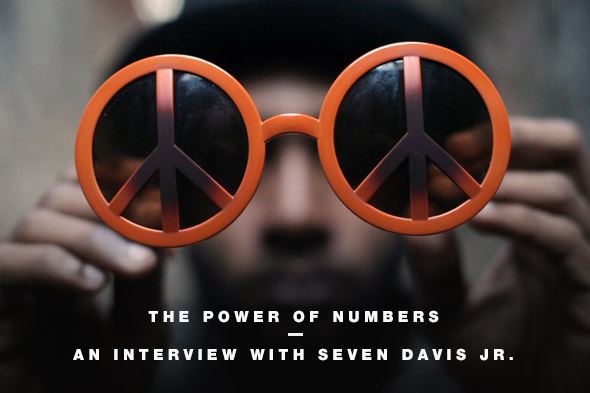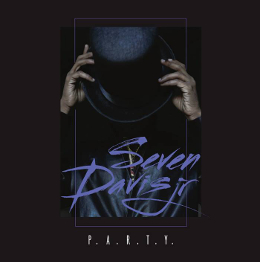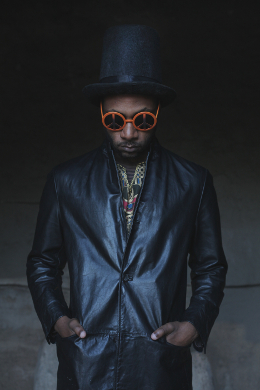The Power of Numbers: An interview with Seven Davis Jr.

The multifaceted Los Angeles-based musician speaks Sun Ra, spirituality, poetry and more with Brendan Arnott.
When I ask Seven Davis Jr. if there’s special meaning in numbers, there isn’t even a beat of silence over our shoddy Skype connection before his response: “Absolutely! …Do you?” The question throws me for a loop. For most of our conversation, Davis exudes a laid back, introverted confidence, but ask the right thing and the energy he responds with makes it clear that something’s permeated on a deeper level. “I mean, for some people it might sound bonkers” he clarifies, “but to me, patterns and numbers are basically messages and signs. It’s hard to explain, but I have a favourite set of numbers and if I see them in a certain circumstance they might mean one thing or another. Take the number seven – there’s a number that holds a lot of spiritual and religious meaning for a lot of people. I have friends from all different religions and it means something different in each.”
Wherever you go, numbers hold power. Some East Asian buildings skip constructing a fourth floor because the number is homophonous to the word “death. Showing a teen either “69” or “420” is guaranteed to elicit chortling. To Houston born, Northern California raised Samuel Davis, the number seven holds some personal meaning, representing his birthday on April 3. Turn the month into a number, and 4 + 3 = 7. After speaking to Davis, attempts to Google popular interpretations of the number seven uncover the fact it’s been thought to widely represent the ideas of thought, consciousness and spirit.
Listen to the aptly titled P.A.R.T.Y. EP on Apron Records and it’s exactly that celebratory spiritualistic vibe that bursts through; it’s a record full of exploratory deep funk jams infused with that same gritty sheen as Kyle Hall and FunkinEven’s collaborative FunkinEvil jam sessions. Davis taps into the same tough to classify, live-in-the-basement energy that keep Moodymann classics like “Long Hot Sex Nights” rolling along without ever becoming repetitive or tiresome –  tracks unafraid to take their time carving out a gritty, satisfying groove that cements itself into your brain with repetition.
tracks unafraid to take their time carving out a gritty, satisfying groove that cements itself into your brain with repetition.
Seven Davis Jr makes music for house parties with broken sound systems, the poorly lit club with the bulletproof glass in front of the DJ booth, the soundtrack to two models stumbling down Hollywood Boulevard holding their high heels in their hands, hollering at strangers. Though Davis believes in the power of numbers, there’s too much organic, free-flowing improvisation coursing through the veins of his productions for them to feel stilted or predictable.
Chatting with the multifaceted artist from his home in Los Angeles, he informs me that he’s in the process of putting sets together for his upcoming live shows, an exercise that involves restructuring a good portion of his catalogue from the bottom up. Since he doesn’t DJ – a declaration that puts him in the minority of producers these days – he’s more engaged with creating revised versions of his tracks that are more conducive to a live atmosphere. “I’ve done a lot of live performance since I was a child – a lot of concert stuff,” Davis tells me, “so when I do live performances, I try to write concert versions of the songs instead of playing the track, so I’m just putting together a live arrangement, an electronic band of sorts.”
When it comes the actual process of laying down tracks in the studio, SDJ has used the phrase “don’t over think things” as a kind of meditative mantra. Intuition is responsible for forming a lot of ideas, he explains. “I definitely want it to be natural. I could start humming something out of the blue, or hear a beat taking shape, or sometimes maybe it’s just drums or a bassline or a phrase that repeats itself in my head… Or, this might sound weird, but sometimes I’ll read something spiritual, and be overtaken by a certain feeling and I’ll let it sit there for a while and then I’ll just be like, ‘okay, I just need to work it out’. But sometimes things emerge after playing around. So as far as a process it could go either way – anything can inspire it.”
That spiritual element that Davis talks about comes from a religious upbringing, being immersed in gospel music from a young age. As an adult, he looks back on his early musical days with a bit more context – speaking of the gospel genre, he shrugs and says “I mean, it’s a business like anything else.” Playing piano back then, Davis admits that early exposure to choirs and gospel music provided the formation for the rest of his music career. “It was where I really learned how to control my voice… gospel and jazz really taught me a lot about vocal control and vocal flexibility.”
Davis points out that while he was raised surrounded by religion, he’s broken away from those definitions and identifies as “spiritual” these days. Since he admits that two large inspirations these days are “spirituality and evolution”, I’m interested in whether or not he thinks there’s a contradiction between the two – some creationists would certainly argue one exists. Davis isn’t one of them.

“I know it might bug some creationist people, but I kinda like breaking rules,” he tells me, “but I believe what I believe, and that crosses territories, but that’s how I feel. Spirituality is these deeply personal beliefs – but I also believe in evolution as a kind of universal truth, and love metaphysical topics too – I feel like it’s the same thing, honestly: Science as another form of spirituality” That feeling of cosmic awe is transferred to Davis’ first collection of poetry (he’s also done script writing for television, although he stays fairly tight-lipped on it). Entitled Life in Deep Space, it contains thirteen years of compiled poetry – a personal and moving collection of work, permeated by phrases like “stars are dead / I am very much alive”.
Though Davis has received comparisons to Prince in the past, his written work reminds me more of interstellar jazz legend Sun Ra, and the coincidences run beyond the fact that old press photos of Davis such as the one above have him decked out in a t-shirt with a gold-embossed Pharaoh on the front (Ra was also quite fond of Egyptian imagery). For Sun Ra, works like Space Is The Place saw the galaxy as a place of possibility; somewhere where the impossible happened on a regular basis. It was another mode of existence, knowledge production, a way to break free from the tethers of a planet that Ra saw as “the sound of guns, anger, frustration.”
Davis admits that he’s especially taken to Sun Ra’s music after making the move to Los Angeles, and sees a similar optimism in his own productions. “They’re definitely positive” he tells me. “Some of it’s dark, but even in the darkness I try to make it positive if you really dig into it and dissect it.” You can hear those vibes emanating through on the FunkinEven edit of “Celebration”, in which a relentless synth pattern stammers over and over upon itself while the bass buoys along, weaving through stomach-lurching permutations. It’s as exhilarating as cruising through palm tree-filled boulevards at sunset, warm dry wind smacking your face.
But things weren’t always so sunny for Davis. Having struggled with his fair share of personal demons throughout his production career, 2013’s IZWID-released Lost Tapes Vol. 1 shows a snapshot of his productions circa the late ’90s, where track names like “I Don´t Give A Fuck”, “Shady Mofos” and “Porno Star” paint a very different snapshot of the artist. Here, his Prince-esque, sleazeball funk reputation shines through, with lines like “forget about the past though / I’m finna take that ass like a class yo” crooned out over viscous, cough syrup addled keys.
Speaking on his productions at that time, Davis admits “the music itself is almost like a character or persona. The younger me was very different from the person you’re talking to right now – very angry, very high on something, if not everything, very wild. So in a way, yeah, I was playing a character. I was actually talking with some friends about the possibility of bringing that identity back for live shows – it’d almost be like me playing the character of my younger self. But that whole persona, all that music from 1999, is, and was…me. My younger self. My youth. Listening to it, you can hear the situation,” Davis laughs.
 “I mean, I got a LOT of flak from those recordings back when I made them. Labels were like ‘what’s your problem’ and other musician friends were like ‘um, is there something wrong with you?’ but I always loved those tracks. In retrospect, you see different things, different parts of yourself – even now, it’s a trip through memory lane.”
“I mean, I got a LOT of flak from those recordings back when I made them. Labels were like ‘what’s your problem’ and other musician friends were like ‘um, is there something wrong with you?’ but I always loved those tracks. In retrospect, you see different things, different parts of yourself – even now, it’s a trip through memory lane.”
Davis feels like his releases do have a chronological element embedded in them. “If you were to put them in order, they kind of represent my growth as a musician. The first music I made, The Lost Tapes Vol. 1, it was more psychedelic, underground hip-hop stuff. From there, One is more like oldies – inspired by Motown-ish soul meets house music, and the P.A.R.T.Y. EP is more jazzy to me, you can hear more of a funk influence showcased.”
One thing remains constant throughout the Seven Davis Jr discography: He’s vehemently anti-sampling. “It’s not like I think anything’s wrong with it” he admits. “I used to do a lot of work with underground rappers and I sampled a lot back then, but I feel like if you can make what you want to hear you may as well make it yourself.”
This D.I.Y production style might be one of the reasons that Davis says that dealing with writer’s’ block isn’t problematic for him anymore. “I can always come up with something, but I always make sure that what I come up with is genuine,” he tells me, putting his words together thoughtfully. “I have tons of unreleased stuff, so much.” Having the freedom to work outside of a traditional nine to five work schedule is also integral to his process. “I know some people who can sit down at the start of the day and work that way, but I can’t. When things get too serious or the process gets dissected too much, I think it takes away from the final project. I’m a big fan of getting it all out – if you want to edit it like crazy afterwards, go ahead, but at least get it all out first.”
 Though Davis has been busy out in the community recently (lighting up Boiler Room with a set that reduced the crowd to a limb-flailing cathartic puddle of sweat), he admits that he’s gotten a bit more introverted as he ages. “I’ve grown into a more solitary type of musician” he admits, “But I don’t mean it in a negative way – there’s a community of musicians that I’m very happy to know. But since I’ve spent a large part of my life only doing work for other musicians and other artists, there was a point where I just decided to do the work for myself. I’m very reclusive, it’s just my personality. People who know me know that I have no problem locking myself in a studio for a week or two and just doing whatever – it’s fun to me, though some people think it’s nuts,” he chuckles.
Though Davis has been busy out in the community recently (lighting up Boiler Room with a set that reduced the crowd to a limb-flailing cathartic puddle of sweat), he admits that he’s gotten a bit more introverted as he ages. “I’ve grown into a more solitary type of musician” he admits, “But I don’t mean it in a negative way – there’s a community of musicians that I’m very happy to know. But since I’ve spent a large part of my life only doing work for other musicians and other artists, there was a point where I just decided to do the work for myself. I’m very reclusive, it’s just my personality. People who know me know that I have no problem locking myself in a studio for a week or two and just doing whatever – it’s fun to me, though some people think it’s nuts,” he chuckles.
While Davis’ connections to a variety of labels such as IZWID, Must Have and Apron means that I’d never classify him as a loner, he seems hesitant to pick a single camp to settle into. This might extend from his youth, where gospel bled into jazz, which transitioned to psychedelia, to trip-hop to house. “When I was younger, people would always say ‘you don’t stay with one group,” Davis asserts. “Personally, I hate to stick with one group. I wanted to experience all different kinds of things in life – different religions, types of music. So I started out with gospel friends, then I had jazz friends, then I started spending a lot of time with hip hoppers.”
The groups Davis grew up around tainted his ideas about house music until he really experienced it for himself. “I went into it having absorbed the opinions of the people I’d been around who had all these ideas like, ‘oh, it’s feminine’. But then I used to hip hop dance, as well as produce hip hop beats for underground rappers and things like that, so when I broke away from the people who had a negative opinion about house, going to a house club was like an extension of the kinda dance I saw in those other hip hop communities – I didn’t see the difference. And house people danced…” here, he pauses, trying to find the right words, “it was different, it was almost similar to walking into an underground hip hop club, but y’know, a lot lighter. More of a peace and love type environment.” That moment, that space where light meets dark, positivity meets despair, past meets future, mechanical analogue machinery meets the warmth of the human voice seems to be the place where Seven Davis Jr. feels most at home. Whether that space is contained inside this universe or not is another story.
Interview by Brendan Arnott
The P.A.R.T.Y. EP by Seven Davis Jr is out on Apron Records this week